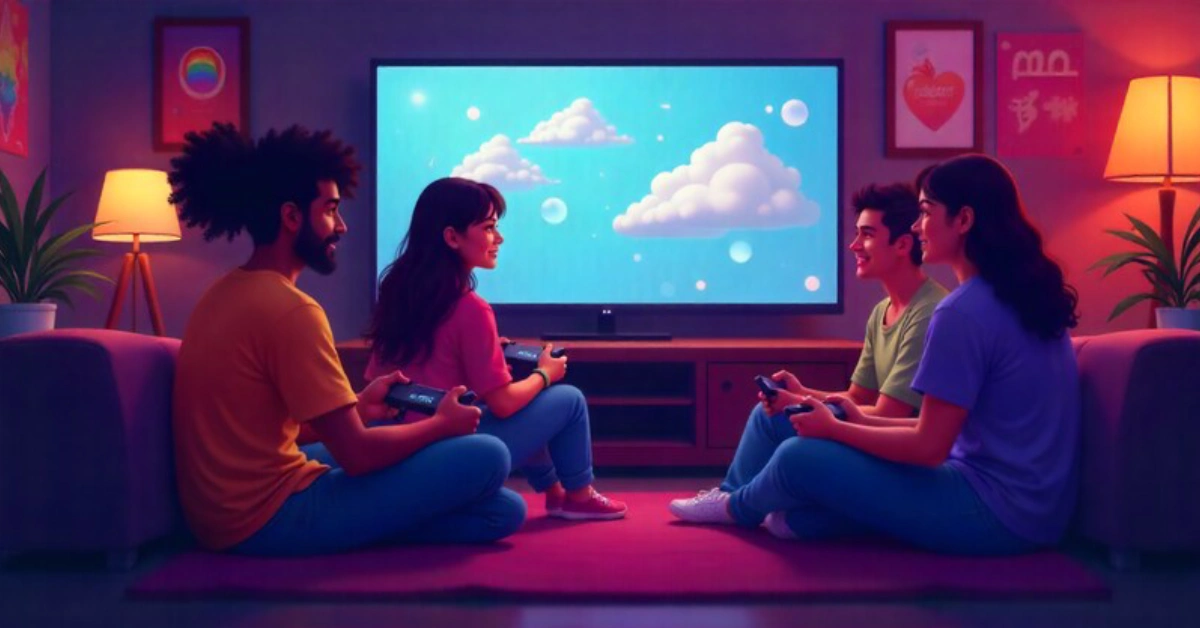You’ve probably noticed gaming isn’t what it used to be. It’s no longer just about high scores or finishing levels. Today’s gaming world has become a space where people explore who they are, connect with others, and find communities that actually get them.
That’s where gaymetu e comes in. This term represents the intersection of LGBTQ+ identity and gaming culture. It’s about queer gamers finding representation, building safe spaces, and celebrating diversity in virtual worlds. Whether you’re a longtime gamer or just curious about this movement, understanding gaymetu e helps you see how gaming has evolved into something far more meaningful.
Let’s explore what makes this shift so important and why it matters for the future of digital entertainment.
What gaymetu e Actually Means
The concept combines “gay” and “game” to describe LGBTQ+ experiences within gaming spaces. It’s not just a buzzword. It represents real communities, authentic stories, and the push for better representation in an industry that’s historically ignored queer voices. Think of it as gaming culture through a queer lens.
For decades, LGBTQ+ characters were either invisible or reduced to harmful stereotypes. Games rarely featured protagonists who reflected diverse sexual orientations or gender identities. When queer characters did appear, they were often jokes or villains. This erasure sent a clear message that these stories didn’t matter.
Things started changing around the 2010s when indie developers began creating games centered on queer experiences. Titles like Dream Daddy and Gone Home put LGBTQ+ narratives front and center. Players could finally see themselves reflected on screen. These games proved that authentic representation could succeed commercially while touching hearts.
Major studios eventually caught on. The Last of Us Part II featured Ellie, a lesbian protagonist whose identity felt natural and integral to the story. Life is Strange gave players Max and Chloe, whose relationship resonated deeply with queer audiences. Even The Sims has long allowed same-sex relationships, giving players freedom to create their own stories.
Today, gaymetu e encompasses everything from game design to streaming communities. It includes Discord servers where LGBTQ+ gamers connect safely. It covers Pride events in games like Overwatch and Final Fantasy XIV. It represents a fundamental shift in how gaming culture treats identity and belonging.
Why Representation in Gaming Actually Matters
Seeing yourself in the media isn’t just nice to have. Research shows that representation affects how people view themselves and their place in society. When young LGBTQ+ individuals play games featuring characters like them, it validates their experiences. It tells them their stories deserve to be told.
Gaming offers something unique compared to passive media like TV or movies. Players actively embody characters and make choices that shape narratives. This interactivity creates deeper emotional connections. When you control a queer character navigating their world, you’re not just watching their story. You’re living it.
Beyond personal validation, representation challenges stereotypes and builds empathy among all players. Straight gamers who experience well-written LGBTQ+ storylines often develop a better understanding of queer experiences. Games become tools for education and connection across different backgrounds.
The business case matters too. LGBTQ+ gamers represent a significant market segment with purchasing power. Studios that ignore this audience leave money on the table while alienating potential fans. Smart developers recognize that inclusive content expands their reach without diminishing anyone else’s experience.
Games That Get LGBTQ+ Representation Right
Not all representation is created equal. Some games include token queer characters as checkboxes. Others craft nuanced, authentic stories that resonate deeply. The difference lies in whether developers consult LGBTQ+ voices and treat these characters as complete people rather than diversity props.
The Last of Us Part II stands out because Ellie’s sexuality isn’t her only defining trait. She’s complex, flawed, and fully realized. Her relationship with Dina feels genuine because the writers focused on building real emotional depth. Players connect with her humanity first, appreciating that her identity enhances rather than defines her character.
Hades from Supergiant Games features Zagreus, who can romance both male and female characters. The game treats all relationships with equal weight and care. There’s no “gay option” versus “straight option.” Just authentic connections that players can pursue based on their choices. This approach normalizes diverse sexuality without making it feel forced.
Celeste tells Madeline’s story as she climbs a mountain while battling anxiety and depression. The game later confirmed Madeline is transgender. Her journey resonates with anyone facing internal struggles. The trans narrative adds depth without becoming the entire plot. It’s representation done with care and intention.
Tell Me Why from Dontnod Entertainment features Tyler, a transgender man, as the playable protagonist. The developers worked with GLAAD to ensure an authentic portrayal. Tyler’s identity matters to his story, but the game focuses on family, memory, and healing. It shows trans characters can lead mainstream narratives.
Building Safe Gaming Communities Online
Representation in games matters, but so does the environment where people play them. Toxic behavior has plagued online gaming for years. Harassment, slurs, and discrimination push LGBTQ+ players away from spaces where they should feel welcome. That’s why dedicated communities have become crucial.
Discord servers specifically for LGBTQ+ gamers provide refuge from toxicity. These spaces enforce strict anti-harassment policies. Members can be themselves without fear of mockery or abuse. They form friendships, organize game nights, and support each other through both gaming challenges and real-life struggles.
Twitch has seen growth in LGBTQ+ streamers who create inclusive channels. These creators build communities around shared values of respect and acceptance. Their streams become safe spaces where queer gamers and allies gather. Viewers find entertainment while connecting with people who share similar experiences and perspectives.
Reddit hosts several active subreddits focused on gaymetu e culture. These forums discuss everything from game recommendations to dealing with online harassment. Members share stories, offer advice, and celebrate wins. The anonymity of Reddit allows people still exploring their identity to participate without pressure.
Twitter and TikTok have amplified LGBTQ+ gaming voices through hashtags and viral content. Creators share clips, reviews, and commentary on representation in new releases. This visibility helps queer gamers find each other and holds developers accountable for their portrayals.
Challenges Still Facing LGBTQ+ Gamers
Progress doesn’t mean all problems have disappeared. Many online spaces remain hostile to LGBTQ+ players. Voice chat in competitive games often features slurs and harassment. Reporting systems exist but don’t always result in meaningful consequences. This creates an environment where queer gamers must choose between staying silent or facing abuse.
Some game developers still treat queer content as controversial. They include minimal representation to avoid backlash from certain player segments. Others add LGBTQ+ characters but give them shallow development. This “representation lite” approach fails to serve anyone well. It doesn’t satisfy queer audiences seeking authentic stories or challenge those unfamiliar with diverse experiences.
Regional censorship creates additional barriers. Some countries ban games featuring LGBTQ+ content outright. Developers sometimes remove queer elements for specific markets. This practice prioritizes profit over principle. It tells LGBTQ+ players their stories matter less than market access.
The esports world faces its own representation challenges. Few openly LGBTQ+ professional players exist at the highest levels. Those who are out sometimes face harassment from fans and competitors. This lack of visibility perpetuates the idea that competitive gaming isn’t welcoming to queer individuals.
What Comes Next for Gaymetu E
The trajectory points toward continued growth and normalization. More developers recognize that inclusive storytelling strengthens rather than weakens their games. As Gen Z becomes the dominant gaming demographic, expectations for representation will only increase. Studios that adapt will thrive while those clinging to outdated approaches will struggle.
Virtual reality and augmented reality present new opportunities for immersive queer narratives. These technologies allow even deeper player investment in characters and stories. Imagine experiencing a coming-out story in VR where you feel the emotional weight of each conversation. The potential for empathy-building through these mediums is enormous.
Independent developers will continue pushing boundaries that major studios fear to cross. Crowdfunding platforms give creators direct access to audiences who want fresh perspectives. This removes gatekeepers who might dilute or reject queer-focused projects. Expect more experimental games exploring identity in ways AAA titles won’t attempt.
The business case for inclusion will become undeniable as data accumulates. Games featuring LGBTQ+ content consistently perform well when marketed properly. Studios will recognize that representation isn’t charity or activism but smart business. This shift from moral argument to economic reality will accelerate change.
Why Gaymetu E Matters Beyond Gaming
This movement extends beyond pixels and controllers. It reflects broader cultural shifts toward acceptance and visibility. Gaming reaches billions worldwide, making it a powerful medium for shaping attitudes. When major franchises include queer characters naturally, it normalizes diverse identities for entire generations.
Young people form significant portions of their social circles through gaming. The friends they make online influence their worldviews. LGBTQ+ inclusive spaces teach empathy, respect, and appreciation for differences. These lessons carry into real-world interactions and relationships.
The gaymetu e community demonstrates how digital spaces can offer belonging when physical ones don’t. For LGBTQ+ youth in unsupportive families or communities, online gaming provides lifelines. They find acceptance, build confidence, and realize they’re not alone. This connection can literally save lives.
Gaming’s influence on other entertainment media continues to grow. Movies and TV shows increasingly draw inspiration from game narratives and aesthetics. As games normalize LGBTQ+ representation, other media follow suit. The ripple effects extend far beyond any single platform or industry.
The story of Gaymetu E is still being written. Every new game with authentic queer characters adds another chapter. Every safe community created provides another space for people to be themselves. Every conversation about representation moves the needle forward. You’re witnessing a cultural shift that future generations will view as obvious and necessary. That’s the power of gaming meeting identity in 2025.

